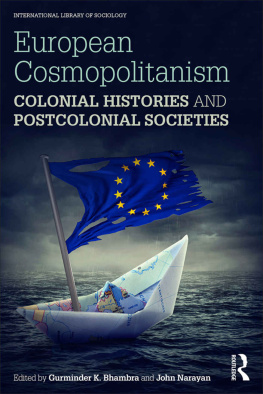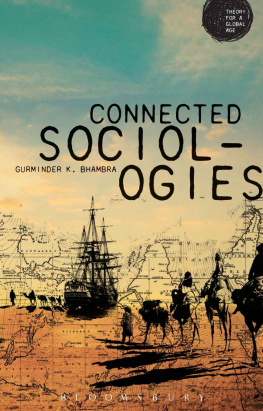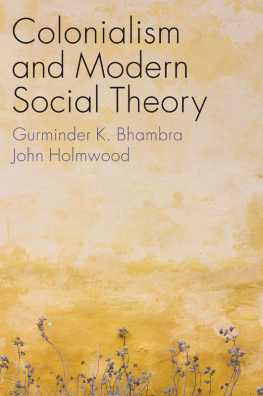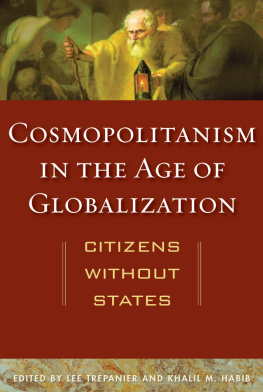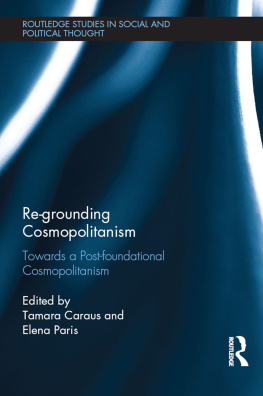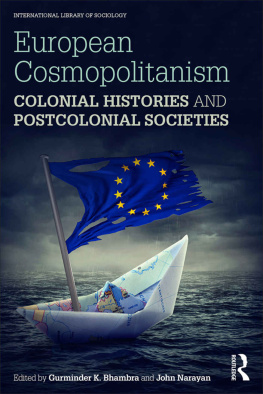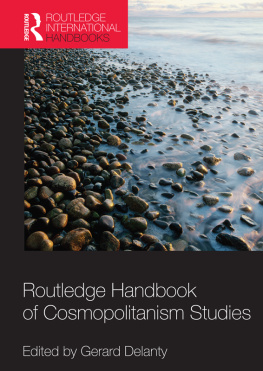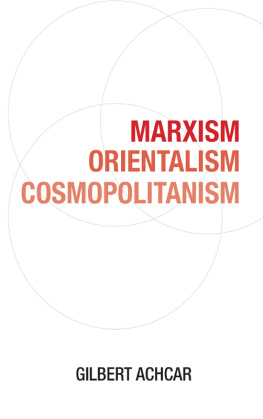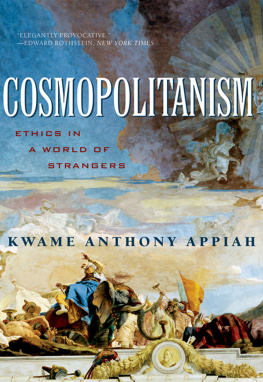Gurminder K. Bhambra - European Cosmopolitanism
Here you can read online Gurminder K. Bhambra - European Cosmopolitanism full text of the book (entire story) in english for free. Download pdf and epub, get meaning, cover and reviews about this ebook. year: 2016, publisher: Taylor and Francis, genre: Politics. Description of the work, (preface) as well as reviews are available. Best literature library LitArk.com created for fans of good reading and offers a wide selection of genres:
Romance novel
Science fiction
Adventure
Detective
Science
History
Home and family
Prose
Art
Politics
Computer
Non-fiction
Religion
Business
Children
Humor
Choose a favorite category and find really read worthwhile books. Enjoy immersion in the world of imagination, feel the emotions of the characters or learn something new for yourself, make an fascinating discovery.
- Book:European Cosmopolitanism
- Author:
- Publisher:Taylor and Francis
- Genre:
- Year:2016
- Rating:4 / 5
- Favourites:Add to favourites
- Your mark:
- 80
- 1
- 2
- 3
- 4
- 5
European Cosmopolitanism: summary, description and annotation
We offer to read an annotation, description, summary or preface (depends on what the author of the book "European Cosmopolitanism" wrote himself). If you haven't found the necessary information about the book — write in the comments, we will try to find it.
European Cosmopolitanism — read online for free the complete book (whole text) full work
Below is the text of the book, divided by pages. System saving the place of the last page read, allows you to conveniently read the book "European Cosmopolitanism" online for free, without having to search again every time where you left off. Put a bookmark, and you can go to the page where you finished reading at any time.
Font size:
Interval:
Bookmark:
In sharp contrast to the anti-historical, methodological Eurocentrism that has permeated the greater part of scholarly work on Cosmopolitan Europe, this book applies a rare, lets call it, methodological cosmopolitanism to its subject matter. In so doing, it not only successfully challenges numerous assumptions and claims concerning the cosmopolitanism in and of Europe (and vice versa). As the books contributions amply testify, it also opens the door to a new, highly enlightening and thus utterly central empirical terrain for the field. This book is an achievement that should define the context for future research and intellectual debate.
Peo Hansen, Professor of Political Science at REMESO, Linkping University
At a time when the EU political project has been called into question as never before in its history, Bhambra and Narayans edited collection offers an insightful exploration of the hidden histories that have shaped cosmopolitan Europe, but are largely omitted by its historical canon. By recovering silenced histories, the book provides us with a novel perspective as well as expanded resources with which to address the challenges of our contemporary society.
Nando Sigona, Birmingham Fellow, Senior Lecturer and Deputy Director of IRiS, Univeristy of Birmingham
This book makes a bold and crucial intervention. It simultaneously challenges the complacencies of elite European self-understandings, whereby an official ideology of European cosmopolitanism in fact reinstates postcolonial historical denial and Eurocentric insularity and excavates the richly cosmopolitan histories of imperial Europes inseparability from anti-colonial cosmopolitanisms, that go beyond Europe. The critical insight and rigor of this collection is indispensable for any serious reflection on the questions of Europe and cosmopolitanism.
Nicholas De Genova, Reader in Human Geography, Kings College London
Whether as idea or ideology, cosmopolitanism has often been seen as the ethical rationale of the trade in goods and meanings. This book presents a far more interesting case for cosmopolitanism. Through intriguing historical narratives, incisive political analysis and sophisticated argument, the authors show that Europe if there ever was one is cosmopolitan at its origins. This not because of some ideational kernel of European thought, but because of the presence and practice of subjected and colonized peoples, on whom Europes imperial states always relied for its development and prosperity, yet whose part in Europe continues to be unrecognized. This is indispensable reading: a first truly cosmopolitan approach to the history and theory of cosmopolitanism.
Stefan Jonsson, Professor at the Institute for Research on Migration, Ethnicity and Society, Linkping University
This is an insightful, rigorous and well-timed book, highlighting the historical legacies behind the present migration crisis or the mourning for an enchanted multiculturalism, looking beyond Eurocentric self-reference. In the vast land of forgotten and silenced histories, the authors have found alternative narratives of cosmopolitanism that can help us to understand present European condition and the complex historical intertwinements that constitute it, offering an unconventional analysis of European cosmopolitanisms sources and ambivalences.
Paola Rebughini, Professor of Sociology and Intercultural Communication, University of Milan
European Cosmopolitanism
This book provides a fresh examination of the cosmopolitan project of post-war Europe from a variety of perspectives. It explores the ways in which European cosmopolitanism can be theorized differently if we take into account histories which have rarely been at the forefront of such understandings. It also uses neglected historical resources to draw out new and unexpected entanglements and connections between understandings of European cosmopolitanism both in Europe and elsewhere. The final part of the book places European cosmopolitanism in tension with contemporary postcolonial configurations around diaspora, migration, and austerity. Overall, it seeks to draw attention to the ways in which Europes posited others have always been very much a part of Europes colonial histories and its postcolonial present.
Gurminder K. Bhambra is Professor and Research Director of Sociology at the University of Warwick and Guest Professor of Sociology and History at the Centre for Concurrences in Colonial and Postcolonial Studies, Linnaeus University, Sweden. She is author of Rethinking Modernity: Postcolonialism and the Sociological Imagination, which won the 2008 Philip Abrams Memorial Prize for best first book in Sociology, and Connected Sociologies.
John Narayan is a Leverhulme Early Career Fellow in the Department of Sociology at the University of Warwick. His research interests are in the fields of globalisation, pragmatism and post-colonialism. He is the author of John Dewey: The Global Public and its Problems.
International Library of Sociology
Founded by Karl Mannheim
Editors: John Holmwood and Vineeta Sinha
Recent publications in this series include:
Theories of the Information Society, 4th Edition
Frank Webster
Visual Worlds
Edited by John R Hall, Blake Stimson, Lisa Tamiris Becker
Travel Connections
Tourism, technology and togetherness in a mobile world
Jennie Germann Molz
Transforming Images
Screens, affect, futures
Rebecca Coleman
Mobilising Modernity
The nuclear moment
Ian Welsh
Illness as a Work of Thought
A Foucauldian perspective on psychosomatics
Monica Greco
Social Class Language and Education
Denis Lawton
Housing Needs and Planning Policy
Problems of housing need and overspill in England & Wales
J Barry Cullingworth, J.B. Cullingworth
European Cosmopolitanism
Colonial histories and postcolonial societies
Edited by Gurminder K. Bhambra and John Narayan
Colonial Histories and Postcolonial Societies
Edited by Gurminder K. Bhambra and John Narayan

First published 2017
by Routledge
2 Park Square, Milton Park, Abingdon, Oxon OX14 4RN
and by Routledge
711 Third Avenue, New York, NY 10017
Routledge is an imprint of the Taylor & Francis Group, an informa business
2017 Gurminder K. Bhambra and John Narayan
2017 selection and editorial matter, Gurminder K. Bhambra and John Narayan; individual chapters, the contributors
The right of Gurminder K. Bhambra and John Narayan to be identified as the authors of the editorial material, and of the authors for their individual chapters, has been asserted in accordance with sections 77 and 78 of the Copyright, Designs and Patents Act 1988.
All rights reserved. No part of this book may be reprinted or reproduced or utilised in any form or by any electronic, mechanical, or other means, now known or hereafter invented, including photocopying and recording, or in any information storage or retrieval system, without permission in writing from the publishers.
Trademark notice: Product or corporate names may be trademarks or registered trademarks, and are used only for identification and explanation without intent to infringe.
Next pageFont size:
Interval:
Bookmark:
Similar books «European Cosmopolitanism»
Look at similar books to European Cosmopolitanism. We have selected literature similar in name and meaning in the hope of providing readers with more options to find new, interesting, not yet read works.
Discussion, reviews of the book European Cosmopolitanism and just readers' own opinions. Leave your comments, write what you think about the work, its meaning or the main characters. Specify what exactly you liked and what you didn't like, and why you think so.

